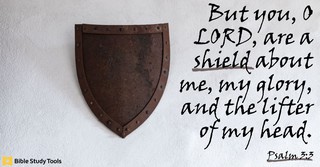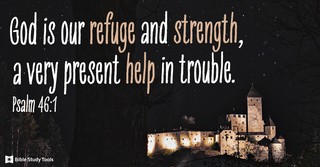6 Psalms to Give You Strength
Share

1. Psalm 18

Key Verses: 1-2 “I love you, O LORD, my strength. The LORD is my rock and my fortress and my deliverer, my God, my rock, in whom I take refuge, my shield, and the horn of my salvation, my stronghold.”
Written by David, this Psalm showers praise on the Lord for protecting and defending His servant through strife. The Psalmist calls God “rock” four times, imagery that Jesus Christ used centuries later in the parable about the two men who built their homes on sand and rock (Matthew 7: 24-27). One house stood, and one fell. The house built on the rock, the life built on God stood firm. This psalm of praise and strength comes after a dark period, when, “the chords of death...the torrents of destruction...the cords of Sheol...the snares of death” served as appropriate descriptions of the writer’s circumstances (Psalm 18:4-5).
In the end, the Rock holds and delivers David. Today, this Psalm reminds the believer to build their life on the Lord, and to call on Him in distress, and He will prevail. As Psalm 18:34 states, “You have given me the shield of your salvation, and your right hand supported me, and your gentleness made me great.”
2. Psalm 27

Key Verse: 14 “Wait for the Lord; be strong, and let your heart take courage; wait for the LORD!”
Waiting is perhaps one of the hardest aspects of life, and waiting on the Lord to provide proves even more daunting for many believers. Just sitting and hoping for change, for answered prayers, for a breath of wind in the doldrums puts a strain on many. It is here where the faith of many is either strengthened, or breaks down.
Psalm 27 is a Psalm of strength, reminding those in a holding pattern that God’s sovereignty and plan will prevail. Attributed to David, and probably written during his early life on the run from King Saul, the Psalm opens with praise and challenge. “The Lord is my light and my salvation; whom shall I fear? The Lord is the stronghold of my life; of whom shall I be afraid?” (Psalm 27:1). David waited for his God to rescue him, with no certainty that Saul would not kill him, other than the promise of God.
When not in crisis, it is easy to trust in the Lord, but in the midst of hard times, those promises can seem far away, or even impossible. This Psalm reminds the believer to take strength in God’s promises, because He will not fail.
3. Psalm 3

Key Verses: 3-4 “But you, O LORD, are a shield about me, my glory, and the lifter of my head. I cried aloud to the LORD, and he answered me from his holy hill.”
Another Psalm written by King David, this serves as both a psalm of thanksgiving, and a psalm for strength. God saved David from the wrath of his son Absalom, who tried to usurp the throne. In the first two verses, the author laments how many enemies he has. While many may not have militarized enemies at the gate like David, it can seem like the odds have been stacked.
By the end of the Psalm, however, the Psalmist reminds himself and the reader that God saves, redeems, and blesses His people. Knowing that at any point the Christian can cry out “Arise, O LORD, Save me, O my God!” with assurance that He will respond, is a great source of strength (Psalm 3:7). God protects and provides for his children, not just in this life, but for eternity. What a source of comfort and strength!
4. Psalm 46

Key Verse: 1 “God is our refuge and strength, a very present help in trouble.”
Perhaps one of the most famous psalms for strength, the forty-sixth psalm inspired Martin Luther to write his celebrated hymn, “A Mighty Fortress is Our God.” Another Davidian psalm, it speaks to the solid and sheltering aspects of God’s character, as well as highlighting that God is the ever-present Helper. The beginning and the end emphasizes the Lord as the ultimate source of strength, saying, “The Lord of hosts is with us; the God of Jacob is our fortress” (Psalm 46:11). The Bible speaks about spiritual battles the believer faces. The assurance that God is the barrier between humanity and spiritual pitfalls inspires great confidence.
Beyond that, the Lord speaks in this psalm. He declares in Psalm 10, “Be still and know that I am God. I will be exalted among the nations, I will be exalted in the earth!” Drawing strength from knowing the believer can be still, rather than giving into the instinct to fight or to flee, comes from a direct command from the Lord. He wants His children to trust and rely on Him, and He desires to be their source of fortitude.
5. Psalm 121

Key Verses: 2-3 “My help comes from the LORD, who made heaven and earth. He will not let your foot be moved; he who keeps you will not slumber.”
Some call this psalm for strength the soldier’s psalm. It is full of promises and assurances. It contains special reminders about how much power the Lord has, and that He uses that power for the good of those who love Him. Not only does verse five call God our keeper, it uses the verb “to keep” four times across its eight verses.
While many try to rely on themselves, to be their source of strength, the psalmist reminds the reader that humanity in its weakness cannot be an all-sufficient source of energy and courage. When the psalm asks in Psalm 121:1b, “From where does my help come?”, the answer is clear. Our help comes from the Lord. Going to God for strength is a sign of appropriate humility, and will keep the path straight. He wants to strengthen the believers and keep them close to Him.
6. Psalm 84

Key Verses: 5-7 “Blessed are those whose strength is in you, in whose heart are the highways to Zion. As they go through the Valley of Baca they make it a place of springs; the early rain also covers it with pools. They go from strength to strength; each one appears before God in Zion.”
Not a Davidic song, scholars attribute this psalm to the Korahites, descendants of a cousin of Moses who have several of the Psalms attributed to them. This psalm is full of God’s promises, perhaps one of the believer’s greatest sources of strength. It speaks of the joy of being in the Lord’s presence; “For a day in your courts is better than a thousand elsewhere…” (Psalm 84:10a). It reminds those following the path set by the Lord that He is always with them, even in the Valley of Baca — sometimes translated as the vale of tears or the vale of weeping
The God who fights our battles, the God who acts as our shield and defender, is taking His followers to Zion for eternal peace in His presence. When the world seems hard and overwhelming, drawing strength from this Psalm can help Christians overcome those moments.
The word of the Lord serves as a well of strength for the believer who turns to it in times of distress. Regardless of the circumstances, studying the Bible, especially the Psalms, for spiritual fortitude with prayer can invigorate an individual’s walk with God.
Sources
Eerdman’s Commentary on the Bible. Edited by James D.G. Gunn and John W. Rogerson. Grand Rapids: Wm. B. Eerdmans Publishing Co., 2003.
Henry, Matthew. Matthew Henry's Commentary on the Whole Bible: Complete and Unabridged. Peabody: Hendrickson Publishers, 2008.
All Scripture images designed by Bethany Pyle
Bethany Verrett is a freelance writer. She graduated from Christopher Newport University with a Bachelor of Arts in English and from Tiffin University with a Masters of Humanities.